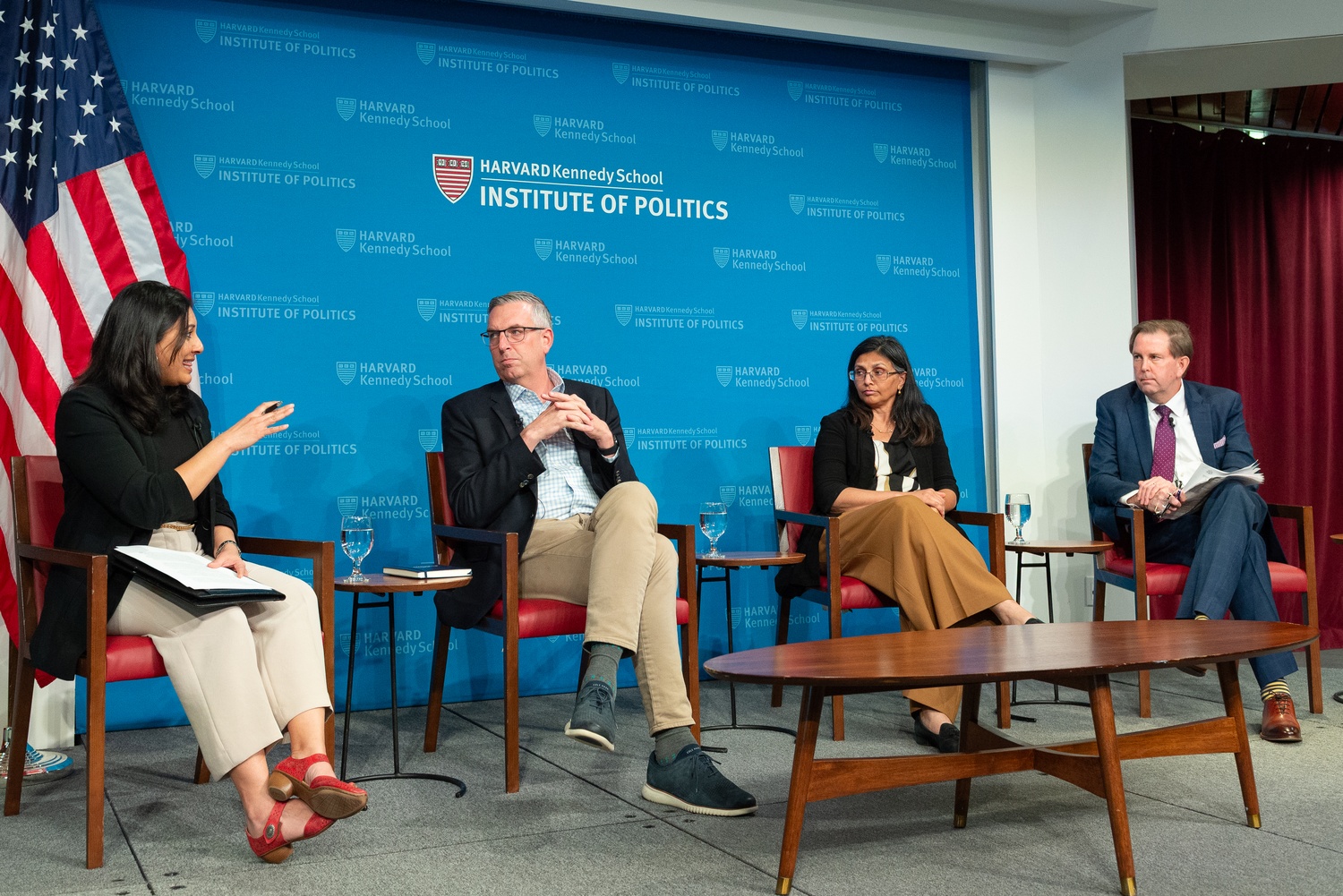
News
FAS Dean Hoekstra Talks Scientific Curiosity and Owl Pellets at Harvard Morning Prayers

News
Former Chicago Mayor Lori Lightfoot Talks Neighborhood Investment at Harvard Graduate School of Design

News
Former Indian Supreme Court Justice Reflects on Her Career at HLS Lunch

Sports
Harvard Women’s Basketball Wins First Ivy Championship, Clinches March Madness Berth

News
Nearly 200 Harvard Affiliates Rally on Widener Steps To Protest Arrest of Columbia Student
Foreign Affairs Experts Debate Impact of USAID Cuts at Harvard IOP Forum

The Harvard Institute of Politics hosted a panel Tuesday evening on the future of foreign aid in the aftermath of the Trump administration’s plans to eliminate more than 90 percent of the contracts for United States International Agency for Development.
Fatema Sumar, the executive director of the Harvard Center for International Development, moderated the panel. The speakers included Nisha Biswal, the former assistant administrator for Asia at USAID; Paul Foldi, vice president for international development affairs; and Jonathan Nash, CEO of Blumont, a leading global non-profit.
The panel began with a discussion of the impacts of these new changes on foreign assistance. While Nash said the changes were “chaotic and absolutely destructive,” Biswal said instead she saw these occurrences as an “acceleration of a journey that we’ve been on for some time.”
The evolution of these international partnerships raises questions about U.S. soft power in foreign affairs.
“Trust in between countries is like trust between friends: It takes years to build trust, and it takes minutes to break it,” Sumar said. “I think the United States has probably broken trust now in a lot of different communities and countries, even where the aid is still flowing.”
Panelists offered mixed views on issues of partnership, which have become central to conversations about foreign aid.
Foldi said he was concerned regarding whether the U.S. would “get to an inflection point where yet another aspect of America becomes a partisan issue” and whether foreign assistance would “become a Democratic issue” that “the Republicans want to shy away from.”
“If that becomes the case, then what I think it’s going to be is a greater concern for our partners and allies overseas regarding the longevity of the relationship with the United States,” he added.
But according to Biswal, “a lot of the initiatives that have formed development assistance have been born out of Republican administrations,” and “we all need to resist the temptation to ascribe it as purely kind of a partisan and look for commonalities.”
“The Build Act and DFC, for example, was created during the first Trump administration, but it actually took shape during the Biden administration,” Biswal said.
Biswal, who has worked in the Biden and Obama administrations, added that Democrats’ “extremely methodical and process-oriented” nature prevented them from moving towards the final outcome in a more focused way, even though many laws were formed under the Democratic administration.
Regardless, the panelists agreed on the importance of active conversations and sharing different perspectives for the future of the foreign relations sector.
“I think the ability for students to interact with practitioners, to get that experience, is one of the absolute benefits of the Kennedy School and this institute,” Foldi said.
Biswal added that the event was a “great” opportunity to have “a candid conversation on some of the changes that are happening” as well as “not just on what has happened and what we’ve lost, but also how we should think about what the future looks like and what we might be able to gain.”
“I think there’s not as much dialogue on USAID, especially after the initial news announcement,” Kevin Chen ’25, an audience member, said in an interview after the event. “I think it’s good that we’re getting a good platform here to talk about it.”
Looking ahead, Nash said the industry would “need people who are creative, who have fresh thinking, to come and help resolve some of these issues and support U.S. engagement around the world.”
“Don’t give up — if you’re mission-driven and you believe in this kind of work, stick with it,” he added.
Want to keep up with breaking news? Subscribe to our email newsletter.
